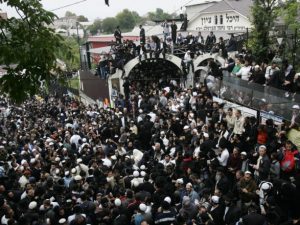
Arrival, an electric car startup founded in Great Britain by former deputy head of the Russian Ministry of Communications Denis Sverdlov, which is restructuring its business amid a set of problems, posted a $1 billion net loss in 2022, according to a company report.
Arrival’s fourth-quarter loss rose to nearly $600 million from $67 million in the same period in 2021, according to preliminary unaudited filings. The figure includes non-cash impairment charges and write-downs of more than $400 million. For all of 2022, the company estimates a loss of about $1 billion, compared with a loss of $1.3 million in 2021, which included a one-time non-cash charge of $1.2 billion related to the merger of Arrival and CIIG.
Adjusted negative EBITDA for the fourth quarter will be up to $172 million compared to $85 million in the same period of 2021. The company attributes the increase to about $70 million more in payroll and contractor costs and about $25 million more in component spending. Expected adjusted negative EBITDA for 2022 is about $380 million versus $203 million in 2021.
The company’s cash balance decreased by $126 million in the fourth quarter to $205 million by year-end. The money was used for working capital ($104 million), interest payments on loans and lease obligations ($11 million), capex expenses and other operating expenses.
Sverdlov (formerly head of operator Yota, and in 2012-2013, deputy minister of telecommunications of the Russian Federation. – Sverdlov (formerly the head of Yota, and Deputy Minister of Communications of the Russian Federation from 2012 to 2013) created Arrival in 2015. The startup raised funds from international investors and planned to roll out mass production of electric vehicles for large cities, proposing the concept of assembly in so-called “microfactories” as an alternative to conveyor car production.
In March 2021 Arrival went public on the Nasdaq exchange through a merger with SPAC. The company’s capitalization immediately after the IPO was valued at $13.6 billion, and Sverdlov, who controls 75% of Arrival through Kinetik Sarl, broke into the top 20 of Forbes Russia last spring. The magazine estimated his fortune as of April 2021 at $10.6 billion.
However, the full-scale war unleashed by Russia against Ukraine, as well as the adjustment of the company’s ambitious production plans, the rejection of the European market and the layoff of some employees led to the fact that the share price of Arrival by the end of November 2022 collapsed by almost 99% – from $22 when it was placed to just over $0.3. The price of the securities below $1 caused Arrival to receive a warning about possible delisting from Nasdaq back in early November. The exchange gave the startup six months, during which its shares must rise above $1 and stay there for at least 10 days in a row.
Amid the problems, Arrival announced plans to focus resources on developing US Van vans for the U.S. market. The company hopes to begin producing them in the U.S. city of Charlotte in 2024 “subject to raising additional capital.” “We will use $330 million in funds to achieve our U.S. goals and look to raise additional funds,” Sverdlov was quoted by Arrival’s press office as saying in a press release for its Q3 2022 reporting.
In early November, Arrival reported that the company may not have its first revenue until 2024, rather than 2023 as previously planned. The company reported a tenfold increase in net loss in Q3 (to $310.3 million) and a $330 million cash reserve, noting that the reserve would fund the business for the next 12 months.
Sverdlov stepped down as CEO of Arrival in late November 2022 to head the board of directors. By the end of January, Peter Cuneo, the company’s acting head, had already handed over the CEO position to Igor Torgov, the former head of telecom operator Skartel (Yota brand), who had previously worked with Sverdlov at Yota.
“After a detailed evaluation of Arrival and the electric car market over the past two months, the company’s management and board of directors have taken decisive action to make better use of current resources and optimize the business. These actions reaffirm our commitment to becoming a leader in innovative products and new, more efficient methods of producing vehicles, especially in the important U.S. commercial electric car market,” Arrival’s press office quoted Torgov as saying in a January announcement.
In the same announcement, the startup confirmed its intention to cut up to 800 people — about half of its staff — to optimize costs. “Combined with other real estate and third-party cost-cutting measures, the company expects to halve its current business spending, to about $30 million per quarter,” the press release said.

The arrival of 5,000 to 10,000 Hasidim in the city of Uman, Cherkasy region to celebrate the Jewish holiday Rosh Hashanah is expected in 2020, and this causes great concern both within Ukraine and the Ministry of Foreign Affairs of Israel, Minister of the Cabinet of Ministers of Ukraine Oleh Nemchinov said.
“Today, a meeting of the State Commission on Manmade Disaster and Emergency Response was held. One of the key issues that were discussed was the planned mass pilgrimage of Breslov Chasidim in September 2020 to the city of Uman, Cherkasy region to celebrate Rosh Hashanah (Jewish New Year),” Nemchinov wrote on his Facebook page.
In this regard, the commission instructed the Ministry of Foreign Affairs to strengthen communication to inform foreign citizens about the restrictions in force in Ukraine, the Ministry of Internal Affairs to strengthen and ensure security during the celebration of Rosh Hashanah, the State Border Guard Service to develop a booklet of stay in Ukraine and distribute it at the crossing Ukrainian border, as well as inform about a possible ban on entry to Ukraine for several years in case of violation of lockdown.
“In addition, at the meeting of the commission, it was noted that in 2020, Ukrainian Christians and Muslims abstained from mass events during the celebration of their largest religious holidays,” Nemchinov said.